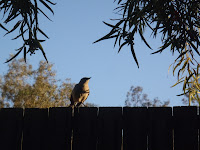There are these things that fly around my backyard, a.k.a birds, a.k.a. uncontrolled variables. And they are starting mo make this gardening process a real hassle. What I am starting to find is that these buggers are digging at what I have planted, I am assuming in attempt to find and eat the seeds. Since I laid out the seeds I come home to find several of the pots knocked over with the soil pecked about; not what I would call the most encouraging sign for hope of growth.
I have bird feeder in my backyard, and have filled it many times before starting this project, so I assume that from this establishment I have already instigated this process by training the birds that "oh! there is food in seed form here for the taking. Enjoy!" I did this because 1. I like birds and 2. I am a closet ornithologist wanna be, so I like to identify birds. For central Phoenix, there hasn't really been any special sightings, but here is what I have identified so far:
- House Sparrow
- House Finch
- Thrasher
- Mockingbird
- Rufous Hummingbird
- Mourning Dove

The Thrasher and Mockingbird are my prime suspects though, as I've seen them dig their longer beaks into the soil in the pots and around them as well. I am not around to block these birds all day, and I don't have something to protect the seedlings from them. Also, what I find interesting is that most of these birds were introduced and thrive in urban areas, so I can't help but think that these were not a problem for the Hohokam tribe that lived here. In fact, the only pest that I could find noted that affected tribes of the southwest was the root cutworm that attacked the corn (Fisher, 2004). Even still, they had figured a way to move their crops to elevations that allowed frost to kill the worm, but as we don't have that luxury of moving (or cutworms, or even the corn for that matter), I see this more as a Indigenous issue as opposed to one that would face an urban farmer. In the mean time, I am still not sure what to do about these birds, and have a hurt hope that anything will grow.



No comments:
Post a Comment